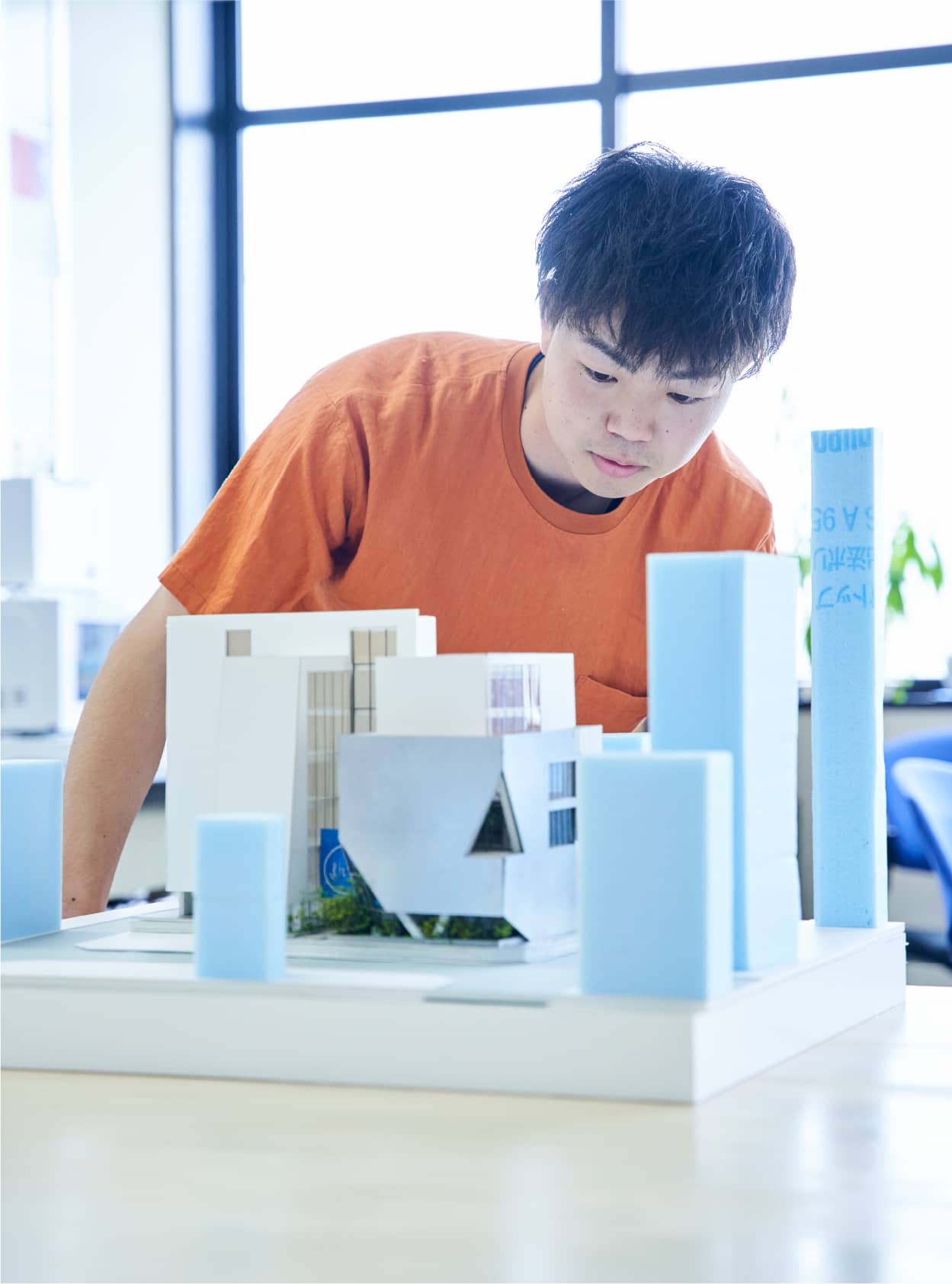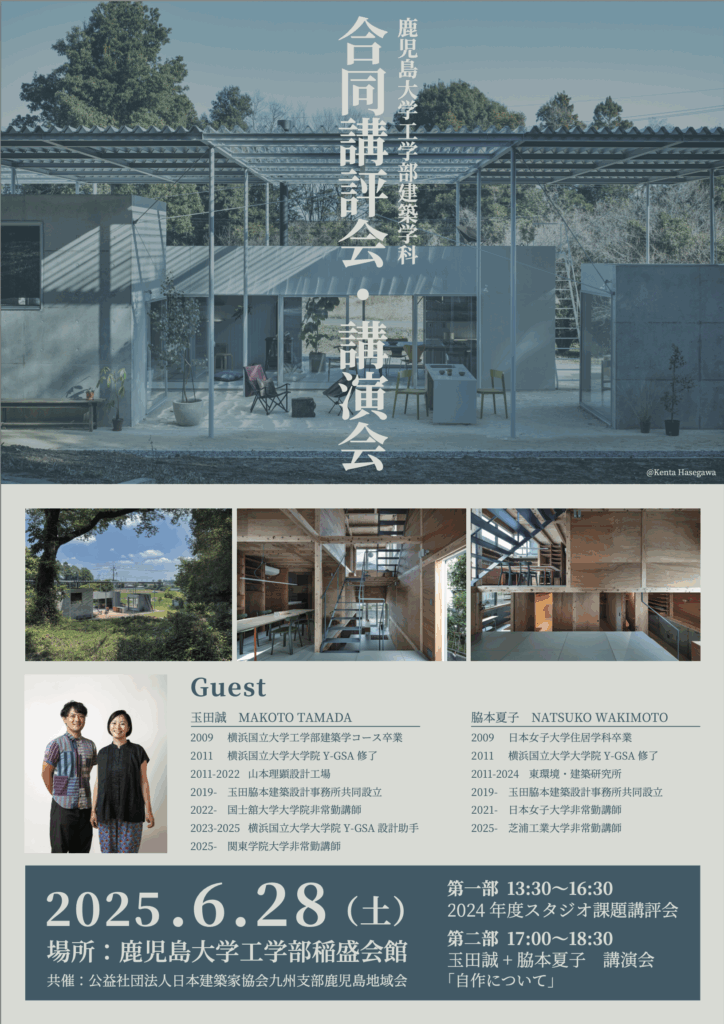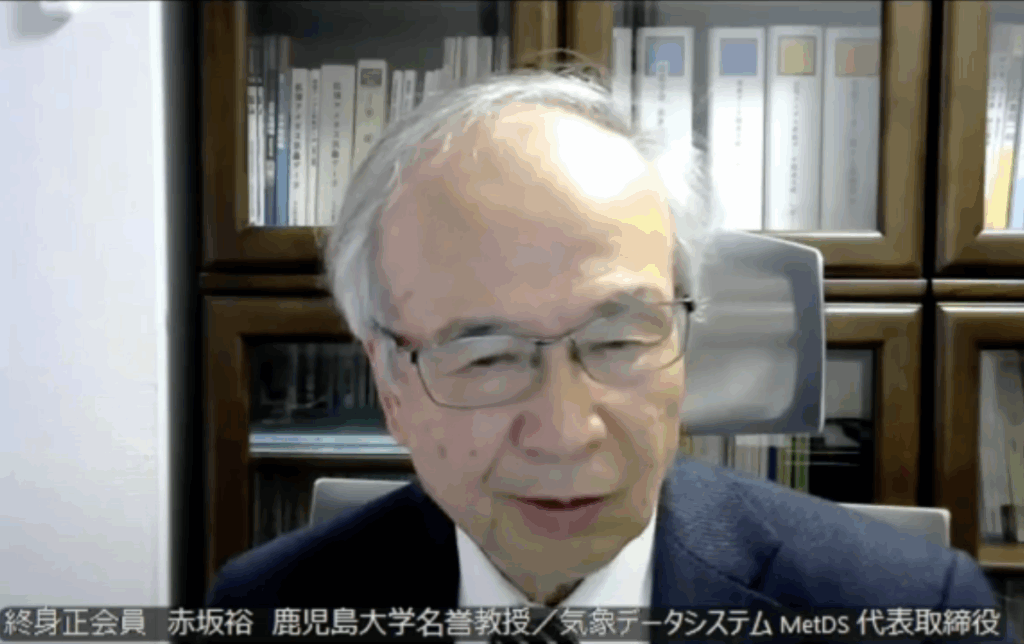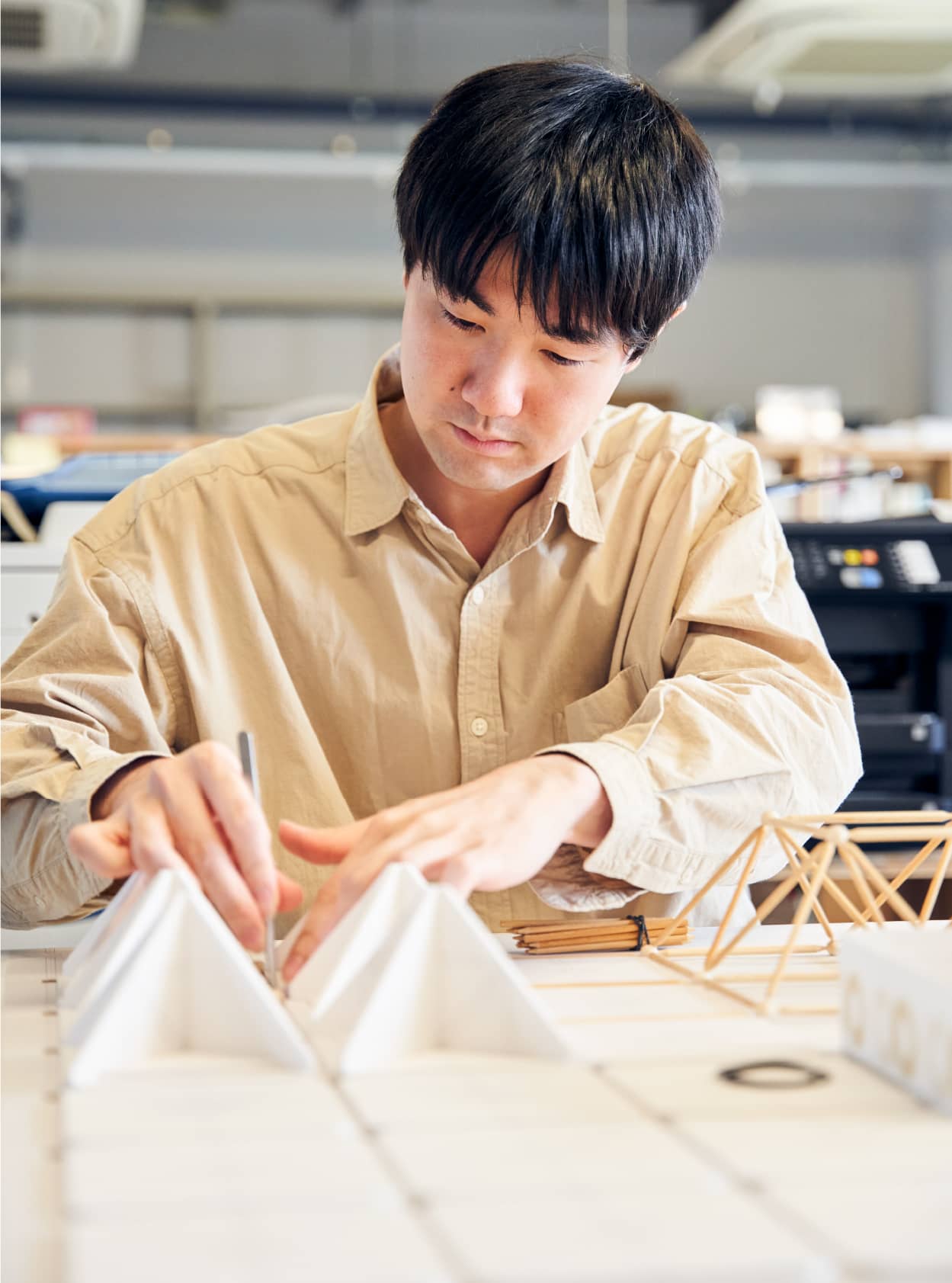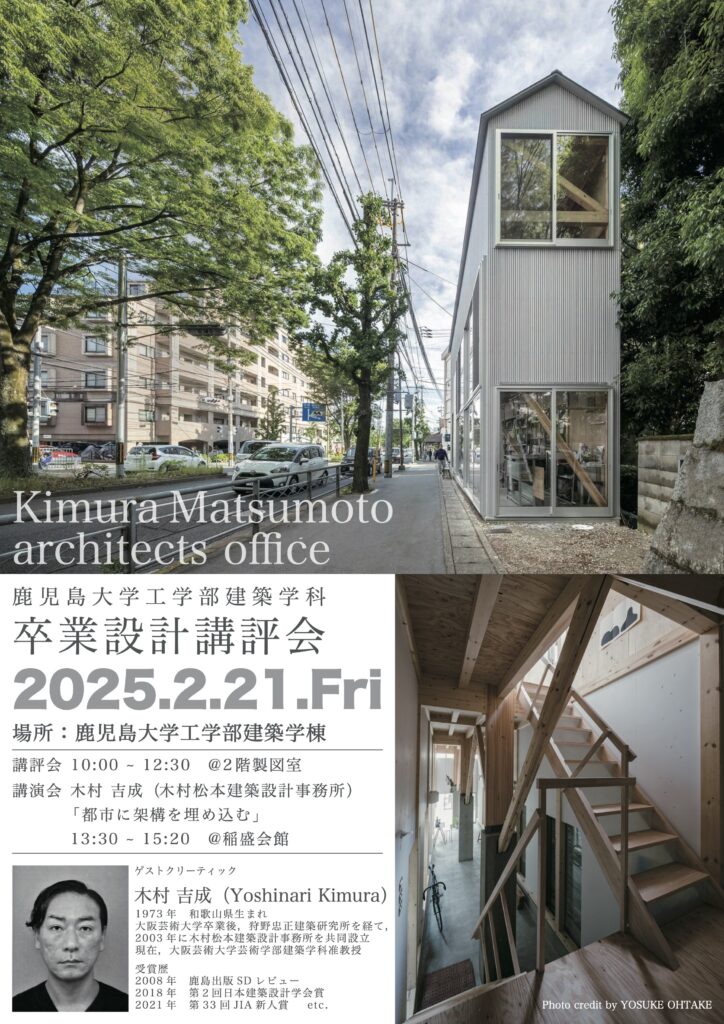Undergraduate and
Graduate Education
Educational Philosophy & Objectives
Learn architecture in depth
□ Educational Philosophy
Architecture is a comprehensive technology, covering perspectives ranging from engineering to the fine arts with the goal of creating space in which human beings may better live and work.
Technologies to build beautiful, comfortable and safe buildings have been developed ever since the first civilization appeared on the earth. What seems most needed in recent years is a combination of a new philosophy and technology for environmental improvement which incorporates the global ecosystem. To this end, we develop human resources who will have learned such a wide range of technologies,who will apply them to pass on architectural culture and conserve the environment, and who will be able to contribute to the creation of architectural spaces.
□ Educational Objectives
We develop architectural engineers who have acquired the basic academic ability in the building technology; specifically, architectural design, architectural planning, architectural structure, building environment and facilities, building production and materials. Graduates of the department will have the ability to create new technologies, a broad perspective and a high standard of ethics, will learn continuously and spontaneously, demonstrate comprehensive problem-solving skills and be able to play an active and vital role in the architectural field both domestically and internationally.
To achieve these objectives, we offer subjects in six fields.

-
Architectural
Design Exercise -
Basic Modeling
Basic Design
Architectural Design
Diploma Design
Application of Digital Design -
Architectural
Planning -
Basic Architectural Planning
Society and Architectural Design
Human Behavior and Architectural Space
Building Codes -
Building
Environment
Facilities -
Environmental Planning
Environmental Engineering
Building Equipment -
Building
Structures -
Introduction to Building Structures
Structural Mechanics
Structural Design for Reinforced Concrete Buildings
Steel Structures
Vibration of Structures and Disaster Prevention for Buildings
Soil Mechanics and Foundation Engineering
Structural Design -
Building
Production
Materials -
Building Structural Systems
Building Materials
Building Construction
Building Material Science and Material Mechanics -
Cross-
disciplinary
Areas -
Civilization and Architecture
Architectural Style and History of Technology
Urban & Country Planning in Contemporary Society
Contemporary Country Construction Planning
History of Local Environments
Compendium for Architecture in the Future
Our education program has been certified by the prestigious Japan Accreditation Board for Engineering Education (JABEE) since the 2006 academic year.



To achieve our educational goals, we maintain a holistic education and have in place, as a comprehensive architecture program, the specific study and educational goals that follow.
- A.The SenseofMissionandEthics RequiredofEngineers
- Cultivate the ability to deal with architecture with a senseofmissionandethics as architectural engineers.
- B.Basic knowledge & abilityofengineering
- Cultivate the basic skillsofengineering to understand building technologies.
- C.Basic knowledge & abilityofarchitecture
- Develop the ability to understandandapply the basic ideasofarchitectureandbuilding technologies.
- D.Advanced knowledge & ability in architecture
- Develop basic skills to understand advanced building technologiesandtherefore the ability to apply these to architectural design.
- E.Ability in engineering, designandlearning especially with the motivation to do so spontaneouslyandcontinuously.
- Develop the abilityandmotivation to study spontaneouslyandcontinuously in ways that lead to the creationofa new architectural culture, innovative building technologiesandflourishingofengineering design ability (ability to present a creativeandeffective solution to a problem which does not necessarily have a correct answer).
- F.Ability to think from multiple perspectives
- Acquire the ability to understand architecture from broad perspectives.
- G.Communication skills and ability to work as a team
- Acquire the basic skills of communication necessary to work in the fieldofarchitecture domestically and internationally, and the ability to work as a team.
Master’s Program is divided into three courses: Architectural Planning, Architectural Environment, and Architectural Structure. The course takes over from the undergraduate curriculum and offers comprehensive education and research opportunities.
In the first year of this department, basic subjects, such as mathematics, physics and languages etc., and general educational subjects, such as philosophy, psychology and sociology etc., are studied. In the second and the third year, advanced subjects are studied, which are concerned with building structures under gravity load, seismic load and wind load, building environment to provide a comfortable space and theories of architectural planning. In addition, architectural design practices are studied over the first 3 year period and a trip to observe buildings in Kyoto, Osaka and Nara is undertaken in the second year. In the fourth year, each student is assigned to one of the following laboratories and produces both a thesis and an architectural design as graduate work.
□ Educational Goals (Philosophy)andProspective Students
Our goal is to educate students who have the ability to identify and solve problems, to master the basic academic skills necessary to experiment and analyze, to apply the results of research to their specialized fields and beyond, and to collaborate broadly with different fields so that they become self-reliant scientists, engi- neers, or researchers in the architectural profession. We welcome individuals with basic scholastic ability and willingness to seek advanced and specialized training through the education and research provided through the Architecture Course.
□ Coursework
Architectural Design Course
Through Architectural Design, students will research and study the design of hospitals and other complex institutions, housing complex design and regional planning, urban planning and landscaping, along with space and architectural design.
Environmental Design Course
Through Environmental Design, students will study and research heating and lightning of living environments, along with indoor environmental control such as air quality, and utilities and equip- ment used within a building.
Structural Design Course
Through Structural Design, students will research and study structural mechanics, load evaluation, evaluation of structural performance, structural optimization, building materials, and construction engineering.spontaneously, demonstrate comprehensive problem-solving skills and be able to play an active and vital role in the architectural field both domestically and internationally.
To achieve these objectives, we offer subjects in six fields.

□ Curriculum
Architectural Design Course
The Architectural Design Seminar is a studio class focusing on architectural, city/town and community planning, and other practical design work. Students will cultivate creativity, train their ability to make comprehensive decisions, and acquire diverse and practical skills in architectural design. “Advanced Architectural Design I and II,” in contrast to studio work, are classes that give students an opportunity to acquire the necessary viewpoints, techniques, technology, and a wide range of knowledge necessary to design buildings and plan cities through architecture.
Environmental Design Course
The Environmental Design Seminar develops students’ practical abilities in assessing the overall environmental quality of a building’ s interior and exterior surroundings from the viewpoints of energy efficiency, ease of use, resource efficiency, artistic effect, and many other various aspects.The Advanced Environmental Design class will provide students with the knowledge and skills necessary to perform comprehensive environmental quality assessment.
Structural Design Course
To design a structure, it’ s necessary to make complete use of a variety of knowledge and techniques. Through the Seminar for Structural Design and Seminar for Advanced Structural Design, students will develop the comprehensive ability to design struc- tures, assess external force, perform stress deformation analysis, design infrastructure along with various other structures in structural design. Advanced Structural Design I and II will provide students with the crucial knowledge and skill required to study structural design.
Japan Accreditation Board for Engineering Education (JABEE) evaluates, as an external organization, whether an engineering education program offered at a higher education institution, such as a university, satisfies the standards that assures the acquisition of knowledge and skill required of engineers working in a society. Our educational program is characterized by an emphasis on basic subjects that architectural engineers must have learned in order to have a successful career in Japan and abroad, and by a curriculum in which students are able to learn advanced knowledge and skills comprehensively. The department obtained the continuous certification of JABEE in 2017 which will be valid until and renewed in 2023.

